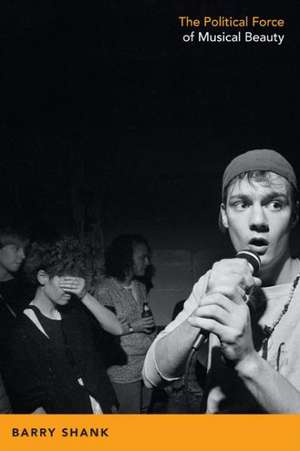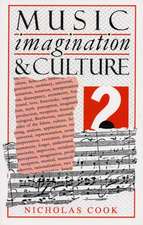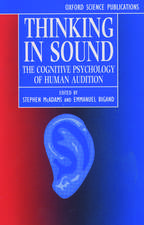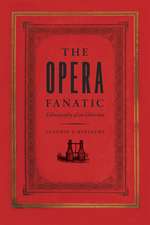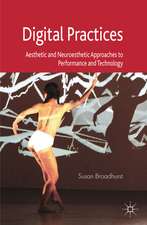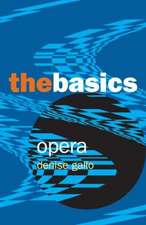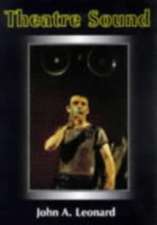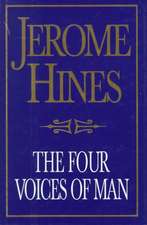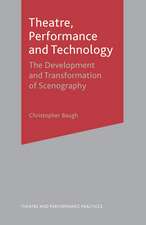The Political Force of Musical Beauty: Refiguring American Music
Autor Barry Shanken Limba Engleză Hardback – 10 apr 2014
In The Political Force of Musical Beauty, Barry Shank shows how musical acts and performances generate their own aesthetic and political force, creating, however fleetingly, a shared sense of the world among otherwise diverse listeners. Rather than focusing on the ways in which music enables the circulation of political messages, he argues that communities grounded in the act and experience of listening can give rise to new political ideas and expression. Analyzing a wide range of "beautiful music" within popular and avant-garde genres—including the Japanese traditions in the music of Takemitsu Toru and Yoko Ono, the drone of the Velvet Underground, and the insistence of hardcore punk and Riot grrrl post-punk—Shank finds that when it fulfills the promise of combining sonic and lyrical differences into a cohesive whole, musical beauty has the power to reorganize the basis of social relations and produce communities that recognize meaningful difference.
| Toate formatele și edițiile | Preț | Express |
|---|---|---|
| Paperback (1) | 264.82 lei 43-57 zile | |
| MD – Duke University Press – 10 apr 2014 | 264.82 lei 43-57 zile | |
| Hardback (1) | 646.65 lei 43-57 zile | |
| MD – Duke University Press – 10 apr 2014 | 646.65 lei 43-57 zile |
Din seria Refiguring American Music
-
 Preț: 159.67 lei
Preț: 159.67 lei -
 Preț: 193.37 lei
Preț: 193.37 lei -
 Preț: 241.55 lei
Preț: 241.55 lei -
 Preț: 173.87 lei
Preț: 173.87 lei -
 Preț: 179.67 lei
Preț: 179.67 lei -
 Preț: 149.76 lei
Preț: 149.76 lei -
 Preț: 176.27 lei
Preț: 176.27 lei -
 Preț: 175.26 lei
Preț: 175.26 lei -
 Preț: 157.59 lei
Preț: 157.59 lei -
 Preț: 168.76 lei
Preț: 168.76 lei -
 Preț: 166.35 lei
Preț: 166.35 lei -
 Preț: 160.40 lei
Preț: 160.40 lei -
 Preț: 130.46 lei
Preț: 130.46 lei -
 Preț: 231.12 lei
Preț: 231.12 lei -
 Preț: 262.32 lei
Preț: 262.32 lei -
 Preț: 263.47 lei
Preț: 263.47 lei -
 Preț: 258.50 lei
Preț: 258.50 lei -
 Preț: 262.32 lei
Preț: 262.32 lei -
 Preț: 306.77 lei
Preț: 306.77 lei -
 Preț: 264.82 lei
Preț: 264.82 lei -
 Preț: 195.18 lei
Preț: 195.18 lei -
 Preț: 305.46 lei
Preț: 305.46 lei -
 Preț: 305.08 lei
Preț: 305.08 lei -
 Preț: 302.19 lei
Preț: 302.19 lei -
 Preț: 238.51 lei
Preț: 238.51 lei -
 Preț: 298.50 lei
Preț: 298.50 lei - 23%
 Preț: 775.73 lei
Preț: 775.73 lei -
 Preț: 304.31 lei
Preț: 304.31 lei -
 Preț: 237.63 lei
Preț: 237.63 lei -
 Preț: 264.82 lei
Preț: 264.82 lei -
 Preț: 245.82 lei
Preț: 245.82 lei -
 Preț: 268.09 lei
Preț: 268.09 lei -
 Preț: 261.38 lei
Preț: 261.38 lei
Preț: 646.65 lei
Preț vechi: 798.34 lei
-19% Nou
Puncte Express: 970
Preț estimativ în valută:
123.74€ • 129.52$ • 102.99£
123.74€ • 129.52$ • 102.99£
Carte tipărită la comandă
Livrare economică 31 martie-14 aprilie
Preluare comenzi: 021 569.72.76
Specificații
ISBN-13: 9780822356462
ISBN-10: 0822356465
Pagini: 344
Ilustrații: 15 illustrations
Dimensiuni: 152 x 229 x 22 mm
Greutate: 0.86 kg
Ediția:New.
Editura: MD – Duke University Press
Seria Refiguring American Music
ISBN-10: 0822356465
Pagini: 344
Ilustrații: 15 illustrations
Dimensiuni: 152 x 229 x 22 mm
Greutate: 0.86 kg
Ediția:New.
Editura: MD – Duke University Press
Seria Refiguring American Music
Notă biografică
Recenzii
"In this ambitious, original, and compelling book, Barry Shank addresses the relation of music to politics. In the process, he makes a significant contribution to aesthetic theory. It is beautifully written, nuanced yet accessible. Its central theme, on the political agency of music, is refreshing and Shank's close readings and formal analyses of musical examples are both richly rewarding and entertaining."--Bernard Gendron, author of"Between Montmartre and the Mudd Club: Popular Music and the Avant-Garde"
"Treating noise as the recalibration of our sensibility settings and a vision for building community on difference, Barry Shank makes a politics of thorny sound. Even better, when this former""Long Ryder"s "member, turned chair of Comparative Studies, takes on Moby's half-borrowed 'Natural Blues, ' Yoko Ono's obstacle course art, the Velvet Underground's 'Heroin' drone, then Patti Smith, Bad Brains, Bikini Kill, and TV on the Radio with Tinariwen, we get something amazingly long in arriving: an exploration of college radio music by a passionate college professor."--Eric Weisbard, editor of"Pop When the World Falls Apart: Music in the Shadow of Doubt"
"Summer is the season for foreground music, when our desire for melodic accompaniment is on spectacular display. It cradles the widely held conviction, astutely explored by Barry Shank in "The Political Force of Musical Beauty, " that the word song does rotten justice to certain units of musical experience. As, for instance, when some tune, in the process of unfolding itself, appears at once to exist for us alone and to matter beyond measure. It can happen in a club or a car or a chair. Such an experience's apparent privacy can make its 'political force'--Shank's apposite term--difficult to capture. Shank draws these effects, and insights into the kinds of collectivity they suggest, from an impressive range of musical forms." --Darby English ""Artforum" "
"Treating noise as the recalibration of our sensibility settings and a vision for building community on difference, Barry Shank makes a politics of thorny sound. Even better, when this former""Long Ryder"s "member, turned chair of Comparative Studies, takes on Moby's half-borrowed 'Natural Blues, ' Yoko Ono's obstacle course art, the Velvet Underground's 'Heroin' drone, then Patti Smith, Bad Brains, Bikini Kill, and TV on the Radio with Tinariwen, we get something amazingly long in arriving: an exploration of college radio music by a passionate college professor."--Eric Weisbard, editor of"Pop When the World Falls Apart: Music in the Shadow of Doubt"
"Summer is the season for foreground music, when our desire for melodic accompaniment is on spectacular display. It cradles the widely held conviction, astutely explored by Barry Shank in "The Political Force of Musical Beauty, " that the word song does rotten justice to certain units of musical experience. As, for instance, when some tune, in the process of unfolding itself, appears at once to exist for us alone and to matter beyond measure. It can happen in a club or a car or a chair. Such an experience's apparent privacy can make its 'political force'--Shank's apposite term--difficult to capture. Shank draws these effects, and insights into the kinds of collectivity they suggest, from an impressive range of musical forms." --Darby English ""Artforum" "
Descriere
Descriere de la o altă ediție sau format:
In The Political Force of Musical Beauty, Barry Shank shows how musical acts and performances generate their own aesthetic and political force, creating, however fleetingly, a shared sense of the world among otherwise diverse listeners. Rather than focusing on the ways in which music enables the circulation of political messages, he argues that communities grounded in the act and experience of listening can give rise to new political ideas and expression. Analyzing a wide range of beautiful music within popular and avant-garde genres--including the Japanese traditions within the music of Takemitsu Toru and Yoko Ono, the drone of the Velvet Underground, and the insistence of hardcore punk and Riot grrrl post-punk--Shank finds that when it fulfills the promise of combining sonic and lyrical differences into a cohesive whole, musical beauty has the power to reorganize the basis of social relations and produce communities that recognize meaningful difference.
In The Political Force of Musical Beauty, Barry Shank shows how musical acts and performances generate their own aesthetic and political force, creating, however fleetingly, a shared sense of the world among otherwise diverse listeners. Rather than focusing on the ways in which music enables the circulation of political messages, he argues that communities grounded in the act and experience of listening can give rise to new political ideas and expression. Analyzing a wide range of beautiful music within popular and avant-garde genres--including the Japanese traditions within the music of Takemitsu Toru and Yoko Ono, the drone of the Velvet Underground, and the insistence of hardcore punk and Riot grrrl post-punk--Shank finds that when it fulfills the promise of combining sonic and lyrical differences into a cohesive whole, musical beauty has the power to reorganize the basis of social relations and produce communities that recognize meaningful difference.
